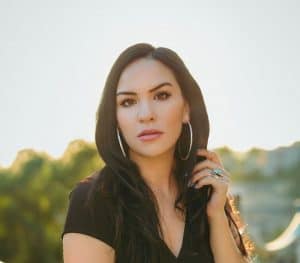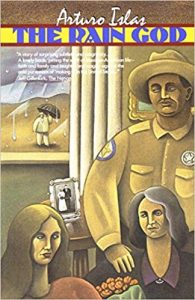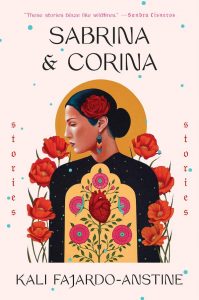The Power of Storytelling: A PEN Ten Interview with Kali Fajardo-Anstine

The PEN Ten is PEN America’s weekly interview series. This week, PEN America’s Public Programs Manager Lily Philpott speaks with Kali Fajardo-Anstine, author of the short story collection Sabrina & Corina (One World, 2019).
1. What was the first book or piece of writing that had a profound impact on you?
The first book which created a profound shift in my awareness was The House on Mango Street by Sandra Cisneros. I was introduced to Cisneros in 10th grade when my Colorado high school participated in an exchange program with a high school in Hungary, bringing to our school a kind and brilliant English teacher named Mr. Andóczi. He was the first person to introduce me to The House On Mango Street. While my class discussed this seminal work, Mr. Andóczi spoke on the humanity of Cisneros’s characters. Her work reminded him of carrying his sick grandmother, by lamplight, from her bed to the small plot of land behind their home, back and forth from the outhouse, whenever she needed to relieve herself.
This moment changed me. I remember feeling that truly great literature was medicine with the ability connect people across cultures, classes, and nations. Sandra Cisneros’s work allowed me to see the power in my culture’s storytelling tradition, and allowed me to see the power within myself.
2. How does your writing navigate truth? What is the relationship between truth and fiction?
In my work, I often pull from lived experiences and family history. I hunt for truth and I revel in displaying it through story. But this comes at a cost. We are often unwilling to face the realities of who we are, and if ever confronted with these aspects of the self, we can either choose to accept these or distort them, distancing ourselves from truth. For these reasons, I choose to expose truth through fiction. For one, it allows me a mask with which to confront my own shortcoming and flaws, but it also provides me with the pleasure of invention. There have been times in my life where my compulsion to express truth borders on stubbornness. Even as a child, I was obsessed with confronting some of the more unsavory aspects of reality. I was the kid who asked why. I took notice when things felt wrong, when adults seemed to withhold information, and I remember all the lies I told myself because within those lies, truth was revealed, a truth about human nature.
My father recently sent me an email with no context. It was a quote from Gabriel García Márquez’s The Autumn of the Patriarch: “A lie is more comfortable than doubt, more useful than love, more lasting than truth.”
“I treat my life as inspiration and I am open to experiences, to coincidences, to watching for signs.”
3. What does your creative process look like? How do you maintain momentum and remain inspired?
When I was a younger writer, in my early twenties, I would get bursts of inspiration and these came when I least expected it. I was once at a Super Bowl party in San Diego, a Lime-a-Rita in my hand, when I felt the muse descend upon me. I rushed home to my apartment and started a draft of my short story “Remedies.” But this model of inspiration is both unreliable and chaotic. As I got older, I began to create a more structured approach to my writing.
My current process for my forthcoming novel is more personally sustainable. Some years ago, I created a detailed scene-by-scene outline of the entire book. I work off this outline, adjusting accordingly. I am not able to write every day due to touring and the emotional anarchy of daily life, but when I do write, I often go away, setting aside devoted time for a project. In this mode, I write at least a 1,000 words a day and I make handwritten notes, visualizing each scene before I commit to writing sentences on the computer.
In terms of inspiration, I treat my life as inspiration and I am open to experiences, to coincidences, to watching for signs. This allows my deeper mind to work on future stories and novels that may or may not ever be written.
 4. What is one book or piece of writing by a Chicanx writer you love that readers might not know about?
4. What is one book or piece of writing by a Chicanx writer you love that readers might not know about?
The Rain God by Arturo Islas, a masterful and heartbreaking novel. It is a subtly moving realist portrayal of Chicanos in the Southwest and one of the primary influences on my debut collection, Sabrina & Corina. The Rain God offers a portrait of the Angel family, spanning three generations in the desert. Arturo Islas would only publish two novels, The Rain God and its companion work Migrant Souls, before he died from complications of AIDS in early 1991. He was the first Chicano to sign a publishing contract with a major house. His work explores the sadness and beauty of the Southwest, and it is robust in its inclusion of queer Chicano characters. Islas writes in sonically clean prose. His setting, a fictional town on the Texas-Mexican border, is vivid and sorrowful. His characters are idiosyncratic, nuanced, and felt, at least by this reader, as if they are real.
5. What is your favorite bookstore, or library?
When I was a teenager, I started working at West Side Books in Denver, a shop specializing in rare and antiquarian books. One of the greatest influences on my writing has come from my life in bookstores, both as a bookseller and a customer.
These are some Colorado bookstores I adore:
Marias Bookshop in Durango, Townie Books in Crested Butte, and West Side Books, Tattered Cover, and Book Bar in Denver.
In terms of libraries, my home library, Denver Public Library, holds my heart. I love visiting the Western History/Genealogy Department, where the archivists and librarians welcome me with open arms, always ready and willing to assist with research.
“I will never stop honoring the lives of my ancestors through my writing. Their resilience, their hardships, and their triumphs—it’s all there on the page.”
6. How does your identity shape your writing? How does the history carried by the elders in your family affect your identity, and in turn, your writing?
The world of my childhood in Denver was enormous. My earliest memories are situated in the homes of my elders who were multicultural Wild West figures. I remember how my great-grandfather Alfonso, who came to Denver from the Philippines in the 1920s, would tinker with cheap jewelry in his basement while my great-grandmother, Esther, would make chile and listen to Patsy Cline in the upstairs kitchen. My five sisters and I would help, and while we cooked and cleaned and listened to sad country songs, we learned about our people. My ancestors were incredibly hard working, generous, kind, and brilliant Coloradans. But they were also poor and brown and this meant our stories were only elevated within our communities. When I began writing seriously in my early twenties, I was reading books by James Baldwin, Sandra Cisneros, Edward P. Jones, and Katherine Anne Porter, and many, many others. I saw how these authors shined the spotlight on their people and I also wanted to write work that was incredibly sophisticated that honored my cultural group, making us more visible in the mainstream. I will never stop honoring the lives of my ancestors through my writing. Their resilience, their hardships, and their triumphs—it’s all there on the page.
7. What is the most daring thing you’ve ever put into words?
Without a doubt, the story “Sisters” from Sabrina & Corina. This piece is based on a family story, inherited trauma that was passed down from generations. I remember being in my apartment in Wyoming and I could hear the character Doty speaking to me, and I knew I had to write this story. It’s one of the most difficult things I’ve ever written, and it made me sick to my stomach to have to write it, but I knew this haunting was never going away.
8. What advice do you have for young Latinx writers?
Please do not give up, keep pushing through with your work and above all keep writing. I say this because there were many times that I was on the verge of giving up myself. I was running out money, I couldn’t get published, I was emotionally and physically exhausted, wondering if any of this would ever matter. To the young Latinx writers out there, please know that we need you and your unique voice. There is someone like me and someone just like you, trying for years and years, coming from behind, needing the guidance of the light you are putting into our world. Thank you for the work you are creating.
9. Which writer, living or dead, would you most like to meet? What would you like to discuss?
Alice Munro.
I would love to discuss craft, time in fiction, the short story form, and the way she renders the lives of women in her stories. But I think, in many ways, when meeting writers whom I admire, I simply want to experience their being.
What kinds of stories would she tell over lunch? What draws her eye? Any knowledge offered is a gift.
 10. In your debut short story collection, Sabrina & Corina, you are broadening the voices we hear in traditional literature of the American West: illuminating the lives of Latinx and indigenous people living in the region. What are your hopes for the literature that will come out of the American West in the next few years? What stories still need to be told, and in 10 or 20 years, what do you hope the genre will look like?
10. In your debut short story collection, Sabrina & Corina, you are broadening the voices we hear in traditional literature of the American West: illuminating the lives of Latinx and indigenous people living in the region. What are your hopes for the literature that will come out of the American West in the next few years? What stories still need to be told, and in 10 or 20 years, what do you hope the genre will look like?
One of the reasons I’m a writer is because I rarely, if ever, saw myself in the literary canon of the American West. It seemed that it was a literary landscape reserved for white men with very few spots for the rest of us. Not being able to identify with canonical literature of the American West was alienating. I was made to feel an outsider in the homeland of my ancestors. Some of the greatest feedback I have received from Sabrina & Corina is from other young Latinx and indigenous women who feel newly inspired to pick up the pen. To that I say, thank you, thank you. I think you will see in the next decade that we are coming for our rightful place in the center of the canon.
Kali Fajardo-Anstine is from Denver, Colorado. Her fiction has appeared in The American Scholar, Boston Review, Bellevue Literary Review, The Idaho Review, Southwestern American Literature, and elsewhere. Kali has received fellowships from MacDowell Colony, the Corporation of Yaddo, and Hedgebrook. She received her MFA from the University of Wyoming and has lived across the country, from Durango, Colorado, to Key West, Florida.






